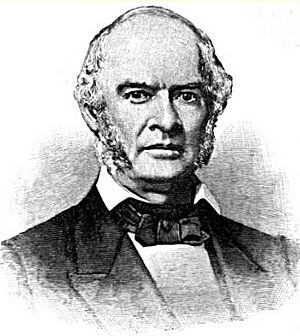George W. Dunlap facts for kids
Quick facts for kids
George Dunlap
|
|
|---|---|
 |
|
| Member of the U.S. House of Representatives from Kentucky's 6th district |
|
| In office March 4, 1861 – March 3, 1863 |
|
| Preceded by | Green Adams |
| Succeeded by | Green C. Smith |
| Member of the Kentucky House of Representatives |
|
| In office 1853–1853 |
|
| Personal details | |
| Born |
George Washington Dunlap
February 22, 1813 Lexington, Kentucky, U.S. |
| Died | June 16, 1890 (aged 77) Lancaster, Kentucky, U.S. |
| Resting place | Lancaster Cemetery |
| Education | Transylvania University |
George Washington Dunlap (born February 22, 1813 – died June 6, 1880) was an important politician from Kentucky. He served as a U.S. Representative, which means he helped make laws for the country.
Contents
Early Life and Education
George Dunlap was born on February 22, 1813, near Lexington, Kentucky. He went to Transylvania University in Lexington and graduated in 1834. After college, he decided to study law.
Becoming a Lawyer
Once he finished his law studies, George Dunlap was allowed to practice law. This is called being "admitted to the bar." He started his law career in Lancaster, Kentucky.
Public Service and Political Career
George Dunlap was involved in public service for many years. From 1843 to 1874, he worked as a commissioner for the circuit court. This role involved helping with legal matters in the local court system.
Serving in Kentucky
In 1853, Dunlap became a member of the Kentucky House of Representatives. This meant he was a lawmaker for his home state of Kentucky.
Representing Kentucky in Congress
George Dunlap was elected to the Thirty-seventh Congress as a Unionist. He served as a U.S. Representative from March 4, 1861, to March 3, 1863. During this time, he helped make decisions for the entire country.
He also led a special group called the Committee on Expenditures in the Department of the Navy. This committee looked at how money was spent by the Navy.
Important Meetings and Legal Work
In 1861, Dunlap was part of the Border State Convention. This was a meeting for states located between the North and the South during a difficult time in U.S. history.
In 1862, he was chosen by the House of Representatives to help with a special legal process. This process was called impeachment, and it involved a judge named West H. Humphreys.
Later Life
After his time in Congress, George Dunlap went back to working as a lawyer. He continued to practice law in Kentucky.
Family and Passing
George Dunlap had a daughter named Eugenia Dunlap Potts, who later became a historian. He passed away in Lancaster, Kentucky, on June 6, 1880. He was buried in the Lancaster Cemetery.
 | Precious Adams |
 | Lauren Anderson |
 | Janet Collins |

